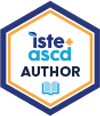
Event Information

Introduction:
*Hook/Story: What did the presenter's own rocky grading past as a student reflect have to do with his inquiry into the often arbitrary nature of the grading process?
*Data share: What grade should each student receive? Elbow partner participants discuss. Why might have one student started off so much ahead of the other? Share out.
Follow up to participants: What grade is fair, accurate, encouraging?
*How does averaging grades and points harvesting conflict with growth mind set?
- Participants reflect on their own learning trajectories: (Stand Up/Pair Up) Discuss..."Once we know something, it is irrelevant that we didn't used to know it."
- Grading solutions: Emphasize most recent performance; Eliminate factors imbued with bias; eliminate the use of zero on the 100 pt scale. (Participants pair share regarding the grading culture changes implied with these solutions.)
* Wider picture: What is the purpose of grades?
- e.g. How many educators do you know who would admit that they use grades to sort and screen students or as punishment and rewards for students?
*Solutions, assuming grades should communicate academic achievement based on standards.
- Grade sparingly
- Eliminate grading class participation, effort, extra credit, etc.
- Encourage practice free from grading stress
*Participant triads discuss options for authentically engaging students, without grade carrots or sticks.
- Use of fewer more distinguishable levels of performance: Rubrics, student trackers, etc.
* Participant pairs discuss how such methods promote clarity and student agency, minimize bias, and are more valid markers of learning progress. (Share out)
- Redos and retakes: Mastery learning
*Challenges to grading reforms
- Participant groups brainstorm implementation challenges likely encountered to...
*Not grading everything
*Redos and retakes
*Moving away from the zero to 100 scale
*Rubrics
*Supporting participation, perseverance, etc., while keeping those out of grades
*Giving up on grading practices that rely on counting the number of correct responses.
- Whole group: Discussion of possible solutions to meet these challenges. (e.g. Incremental change...Implement on grade reform at a time.)
*Conclusion: What are you willing to commit to?
- Participants set their own implementation goals and share with neighbors. (Short-term wins can add up to a seismic shift in grading and reporting.)
Dweck, C. S. (2006). Mindset: The new psychology of success. New York: Random House.
Feldman, J. (2024). Grading for equity: What it is, why it matters, and how it can transform schools and classrooms (2nd ed.). Thousand Oaks: Corwin Press.
Feldman, J., & Reed Marshall, T. (2020). Empowering Students by Demystifying Grading.
Educational Leadership, 77(6).
Hammond, Z. (2014). Culturally responsive teaching and the brain: Promoting authentic engagement and rigor among culturally and linguistically diverse students. Thousand Oaks: Corwin Press.
Hough, L. (2019, May). Grade Expectations: Why We Need to Rethink Grading in Our Schools. Ed. Magazine, Retrieved on April 8, 2024 from https://www.gse.harvard.edu/ideas/ed-magazine/19/05/grade-expectations
Wormeli, R. (2011, November). Redos and Retakes Done Right. Educational Leadership, 69(3).



